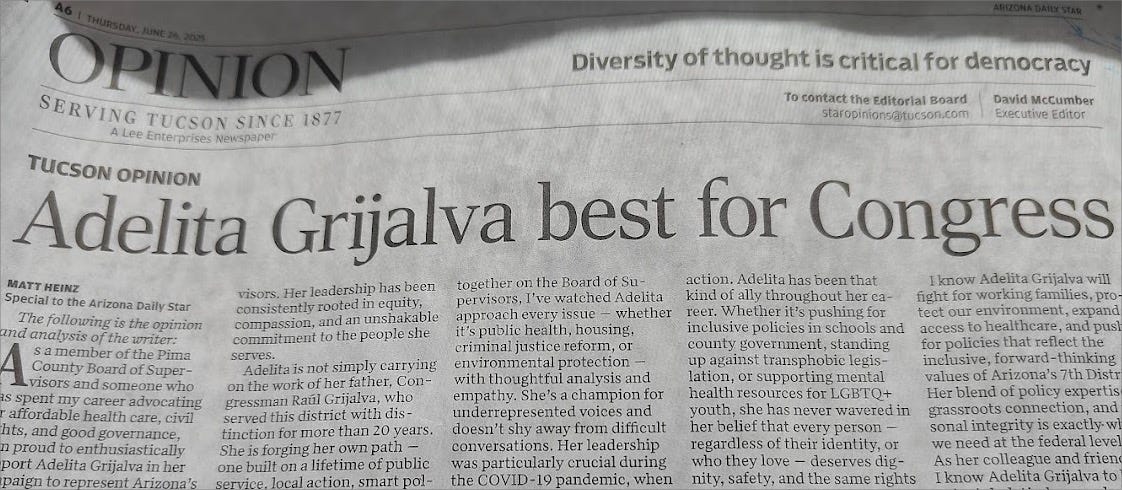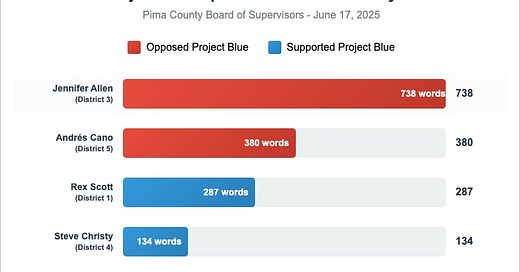🔇 The Silence of the Supervisor: Matt Heinz's Double Standard on Democratic Discourse
When it comes to corporate colonialism, Pima County's Matt Heinz saves his voice for campaign endorsements while staying mum on billion-dollar decisions
😽 Keepin’ It Simple Summary for Younger Readers
👧🏾✊🏾👦🏾
🤔💦👔: A Pima County supervisor, Matt Heinz, just penned a lengthy article supporting Adelita Grijalva for Congress, 🗳️ highlighting her listening skills and decision-making prowess.
Yet, just a week earlier, during a crucial vote on a tech company's plan to build a massive computer center 🌐 that would gulp down millions of gallons of water daily, 🌊 he kept silent about his reasoning. After his 'yes' vote, 💧 the electric company announced a 14% hike in bills!
💸 Now, he's backtracking, suggesting a reevaluation of that decision. 😬 People are frustrated! 😡 He seems verbose on political topics but silent on local issues impacting water and electricity costs. 📈🏜️
🗝️ Takeaways
🔇 Selective Speech: Matt Heinz wrote 600+ words endorsing Adelita Grijalva for Congress but said zero words explaining his Project Blue vote
💰 Corporate Colonialism: Project Blue represents Bay Area venture capitalists extracting resources from Indigenous lands while leaving environmental costs to locals
⚡ TEP's Timing: The utility announced a 14% rate hike just hours after Project Blue approval, despite promises that ratepayers would be "protected"
🏜️ Water Crisis: The data center will consume 1-5 million gallons daily in a drought-stricken desert, prioritizing AI training over community needs
📊 The Silence Gap: Supervisors who opposed Project Blue averaged 559 words of explanation; those who supported it averaged just 140 words
🗳️ Democratic Deficit: When politicians save their eloquence for endorsements while staying silent on governance, democracy suffers
The Silence of the Supervisor: Matt Heinz's Double Standard on Democratic Discourse
In the dusty democracy of Pima County, where words carry water and silence speaks volumes, we've witnessed a masterclass in political priorities this past week.
Dr. Matt Heinz, our District 2 Supervisor, has found his voice—but only when it comes to congressional campaigns, not corporate colonialism.
Last Wednesday, Heinz penned a passionate 600-word op-ed for the Arizona Daily Star, endorsing Adelita Grijalva for Congress. The piece waxed poetic about her "thoughtful analysis and empathy" and her approach to "every issue—whether it's public health, housing, criminal justice reform, or environmental protection."
Beautiful words, hermano. Truly moving.
But here's where the ironía gets thicker than summer monsoon humidity: Just ten days earlier, when Heinz cast one of the most consequential votes in Pima County's recent history—approving the $3.6 billion Project Blue data center—he offered exactly zero words of explanation to the public he serves.
The Great Silence of June 17th
According to our analysis of the June 17th Pima County Board of Supervisors meeting, when it came time to explain his vote on Project Blue—a decision that will fundamentally reshape Tucson's energy and water future for generations—Matt Heinz delivered a grand total of zero words during public discussion.
Compare that to his colleagues who opposed the project:
Jennifer Allen (District 3): 738 words explaining her opposition, diving deep into environmental concerns and intergenerational responsibility
Andrés Cano (District 5): 380 words about protecting water and growing responsibly
Even supporters spoke up:
Rex Scott (District 1): 287 words supporting the project while ignoring the overwhelming amount of callers to his office opposing Project Blue
Steve Christy (District 4): 134 words about utilizing vacant land
But Heinz? Nada. Zilch. Zero.
The statistics are stark: Those who opposed Project Blue averaged 559 words per supervisor, while those who supported it averaged just 140 words.
And Heinz, who cast the deciding vote in a 3-2 decision, contributed exactly nothing to the public record.
Corporate Colonialism Comes to Tucson
Let's be clear about what Project Blue represents.
This isn't just economic development—it's the latest iteration of corporate colonialism, where multinational tech giants extract resources from nuestra tierra while leaving communities to deal with the environmental and economic consequences.
According to recent reporting, this data center will consume between 1-5 million gallons of water daily in a desert that's rapidly running dry. It will become one of TEP's largest electricity customers, driving up demand for energy infrastructure that ratepayers will ultimately subsidize. \
And for what? A promised 75-180 permanent jobs in an economy that desperately needs affordable housing, not server farms.
The project is being developed by Beale Infrastructure for Humphrey's Peak Properties, LLC, of San Francisco—because nothing says "local economic development" like handing our public lands over to Bay Area venture capitalists.
The TEP Two-Step
But here's where Heinz's silence becomes particularly damning. Hours after the Board voted to approve Project Blue—literally minutes after the meeting ended—TEP announced a 14% rate increase request to the Arizona Corporation Commission.
Suddenly, Heinz found his voice again. He called for the Board to reconsider its approval of Project Blue, stating that "the optics were bad" and that the timing was "untenable."
¿En serio? The optics were bad?
The problem isn't optics, compadre—it's governance. When you vote for a multi-billion-dollar project that will reshape our community without explaining your reasoning to the public, that's not an optics problem. That's a democracy problem.
TEP, for its part, claims the rate increase has nothing to do with Project Blue, calling the timing coincidental. Right. And I have some beachfront property in Ajo to sell you.
The Contrast in Communication

The contrast couldn't be starker. When it comes to supporting a political candidate—something that requires no legal authority and carries no binding consequences—Heinz writes eloquently about Grijalva's "lifetime of public service" and her fight for "underrepresented voices."
But when it comes to casting a vote that will legally bind Pima County to sell 290 acres of public land to corporate developers? When it comes to a decision that will impact water resources, energy infrastructure, and economic development for decades?
Silence.
Here's what Heinz managed to say about Grijalva's leadership: "During our time working together on the Board of Supervisors, I've watched Adelita approach every issue—whether it's public health, housing, criminal justice reform, or environmental protection—with thoughtful analysis and empathy."
Fascinating.
Because when I watched Heinz approach Project Blue—an issue that touches on public health (air quality), housing (gentrification pressure), and environmental protection (water and energy consumption)—I saw no public analysis, thoughtful or otherwise.
The Indigenous Perspective
From an Indigenous Chicano perspective, this pattern is all too familiar. When our communities face extractive projects—from copper mines to data centers—we're told about economic benefits while being excluded from meaningful consultation about environmental costs.
Project Blue sits on land that has been home to Tohono O'odham peoples for centuries, in a watershed that sustained life here long before corporate tech bros decided they needed more server space for training AI models. The decision to approve this project without robust community input or environmental impact assessment represents the continuation of colonialism by other means.
And when our elected representatives vote for such projects without explanation, they're participating in that same system of extraction, taking democratic legitimacy from the people and handing it over to corporate interests.
It’s the new Manifest Destiny.
The Real Questions
So here are the questions Matt Heinz should have answered on June 17th, instead of saving his words for campaign endorsements:
How exactly will Project Blue "protect existing ratepayers" when TEP is already requesting a 14% rate increase?
What guarantees exist that the promised water infrastructure benefits will actually materialize?
Why should Pima County sell public land below market value to Bay Area investors?
How does consuming millions of gallons daily in a drought-stricken desert align with climate commitments?
What happens to our community if this AI bubble bursts and the data center becomes a stranded asset?
These are the questions that demand 738 words of explanation, not platitudes about political candidates.
The Pattern of Priorities
This isn't just about one vote or one op-ed.
It's about a pattern that reveals where our elected officials' priorities truly lie. When it comes to activities that enhance their political capital—such as endorsing candidates, attending fundraisers, and building coalitions—they're eloquent and engaged.
But when it comes to the hard work of governance—explaining difficult votes, engaging with community concerns, and standing up to corporate power—they suddenly develop laryngitis.
Heinz's expertise as a physician should make him particularly sensitive to the health impacts of industrial development in our community. His experience as a gay man should make him understand what it means to have your voice excluded from decisions that affect your life. His role as an elected Democrat should commit him to transparency and community engagement.
Instead, we get silence when it matters and speeches when it doesn't.
Beyond the Individual
To be clear, this isn't just about Matt Heinz.
It's about a Democratic Party that has lost its way, prioritizing corporate-friendly "economic development" over community empowerment and environmental justice. It's about a political system that rewards politicians for saying the right things about inclusion while practicing exclusion in their governance.
When Heinz writes that Grijalva "doesn't shy away from difficult conversations," he's inadvertently highlighting his own failure to engage in the difficult conversation about Project Blue.
When he praises her for being "a champion for underrepresented voices," he's pointing to his own silence when those voices needed amplification in the Project Blue debate.
The Path Forward
The good news is that democracy doesn't end with one vote. Heinz has called for reconsidering the Project Blue approval, though only after public pressure and TEP's rate hike announcement made the political cost of silence too high.
Chances are that it is too late, since this involved the selling of land, and for the county to take back its sale would be legally difficult.
The Board of Supervisors will meet again on July 1st, and the project still needs Tucson City Council approval for annexation. There's still time for community voices to be heard, for environmental concerns to be addressed, and for our elected representatives to demonstrate the kind of leadership they claim to admire in others.
What You Can Do
If you believe that our elected representatives should explain their votes as thoroughly as they explain their endorsements, here's how to get involved:
Contact the Board of Supervisors and demand transparency on Project Blue's environmental and economic impacts
Attend the July 1st Board meeting and make your voice heard during public comment
Monitor Tucson City Council as they consider the annexation of the Project Blue site
Support Three Sonorans Substack to stay informed about corporate colonialism in our borderlands
Organize your neighbors because individual voices become powerful when united
The fight for environmental justice and democratic accountability isn't won in editorial pages or campaign rallies—it's won in community meetings and public hearings where decisions that affect our daily lives are actually made.
Si se puede, but only if we show up and demand that our representatives do the same.
Three Sonorans lives and writes in the borderlands of Southern Arizona, where the desert teaches hard lessons about adaptation, resistance, and the true cost of extraction.
Have a scoop or a story you want us to follow up on? Send us a message!









Anyway this piece really isnt about Adelita. Its about the secrecy and lack of serious consideration of a project where nobody is allowed to know or say anything all while obviously causing higher water and electricity rates to all of us. It appears to be totally inappropriate for a water guzzling electricity sucking project to be in a desert from the get-go! There are states that have so much water they use it to GET electricity but they want this project HERE?!
Voted for Adelita Grijalva and I wish her well ! You also supported Tulsi Gabbard! You opinion is invalid IMHO